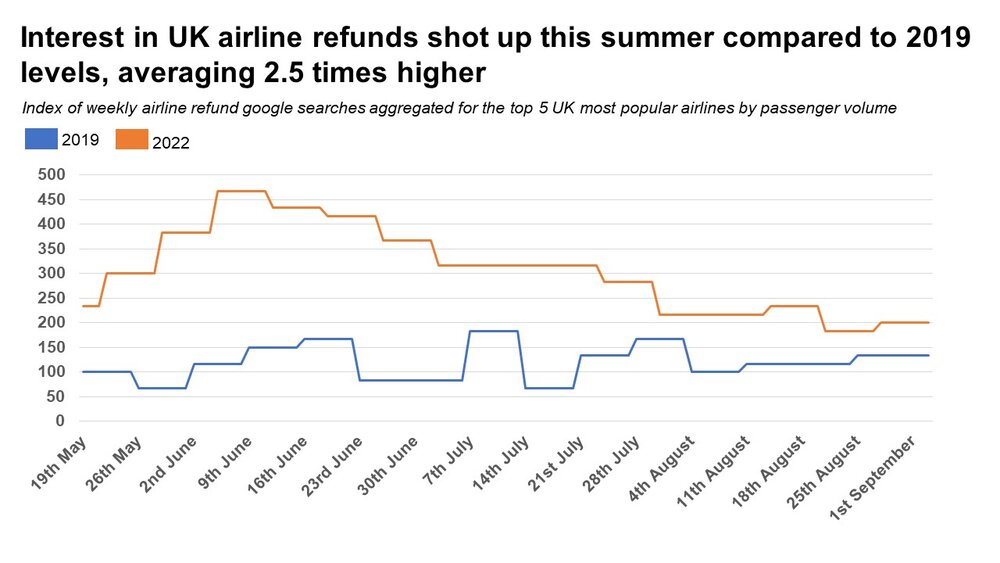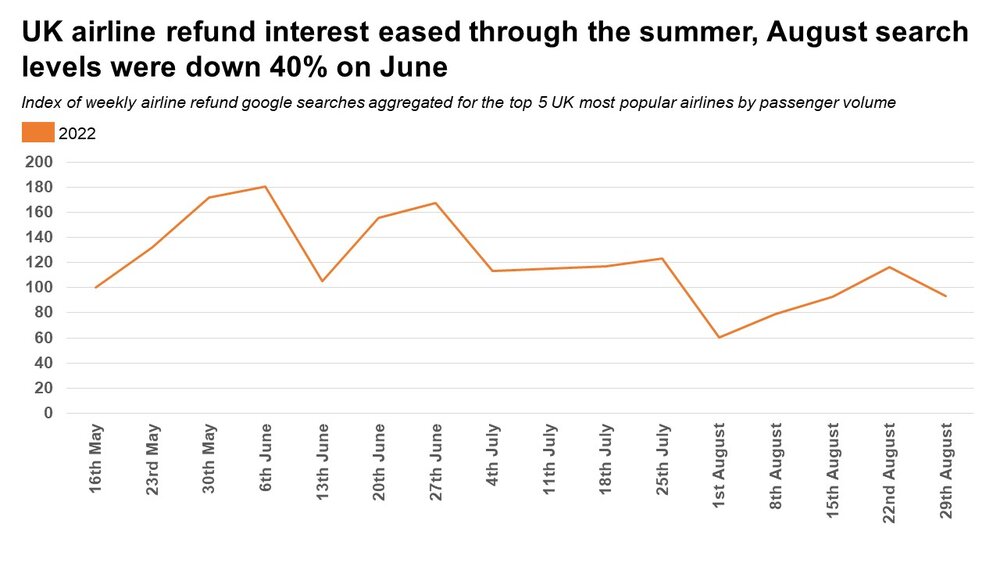Emily Whalley, senior travel specialist at payments orchestration tech firm BR-DGE, says the speed with which firms handle refunds reinforces their credibility and relationship with customers
_w=800_h=1030_pjpg.jpg?v=20230522122229)
Guest Post: Opportunity to innovate in the refunds space has never been greater
This summer saw airlines face considerable challenges in ramping up their summer flight schedules, with the pandemic’s lasting impact on the travel sector laid bare.
Thousands of delays and cancellations took place following airport disruption, resulting in a third of UK adults reporting that they experienced disruption to their travel plans.
In turn, this led to increased consumer demand for refunds with consumers going online and often turning to social media to begin their refund journey.
How travel disruption impacted the travel sector this summer
A BR-DGE analysis of Google Trends data in the UK revealed that consumer searches for airline refunds from the five most popular UK airlines remained high this summer compared to pre-pandemic levels.
Worryingly, searches for airline refunds were 2.5 times higher than in 2019 despite Eurocontrol forecasting that European air traffic volumes were down by 15% versus 2019.

Source: Google Trends, BR-DGE
Often refund requests from passengers spill out on to social media; a social media analysis by BR-DGE shows that customer service teams at the top five UK airlines received over 3,000 public messages regarding refunds via Twitter alone during the 12 week period up to August 7.
This is an eye-watering 33% increase on the year-to-date average, highlighting the challenge airlines, OTAs and transport providers face with refunds during periods of disruption.
The innovation opportunity in travel refunds
During a period when the sector is seeking to return to growth, the strain of refunds poses a significant threat to travel provider margins.
The knock-on effect of the summer disruption will see the travel sector pay out millions of pounds to passengers in refunds.
As a result of this, airlines and OTAs will be forced to commit increased customer service resources and money to deal with backlogs as the refunds process remains a slow and clunky process for many.
Yet, committing more resources does not resolve the overarching challenge of delivering an intuitive payment experience both internally and externally for customers. The opportunity to innovate in the refunds space has never been greater.
Our research shows that refunds are now a key part of the customer journey so there is a real opportunity for the sector to improve in this area as part of its wider work to enhance the end-to-end passenger experience.

Indeed, the speed in which travel operators handle refunds reinforces an organisation’s credibility to ensure the relationship with customers does not falter.
Consequently, customers will have the trust to rebook or take a voucher option with their original provider, as opposed to a full refund, further enhancing brand loyalty.
How to deliver a first-class refunds experience
It is vital that travel providers take advantage of this opportunity and consider new technologies and systems that can deliver a smooth, automated refund experience for passengers.
Here on in, the travel industry should invest in creating an efficient refund process as part of its broader innovation within payments.
Payment orchestration is just one tool that can equip travel merchants with a more resilient, simplified, and automated refund process with one single API.
By bringing all payment providers under one roof, the speed of refunds can be improved so that passengers receive refund outcomes within hours rather than days.
Furthermore, payment orchestration streamlines the chargeback process, ensuring that refunds are not duplicated and that charges are not applied twice.
This removes the complexities of the refund process, overcoming legacy systems and empowering merchants with a curated payment process that works for travel businesses and puts the passenger at the heart of the refund experience.
Whilst we might breathe a sigh of relief that the travel industry weathered the storm this summer, it would be wrong to overlook the structural challenges facing the sector.
Refunds is just one area where the sector will need to work hard in the future to overcome ongoing challenges.
Forward-thinking firms that pick up the mantle and embrace the opportunity to make refunds first-class will receive business benefits and improve customer loyalty.



